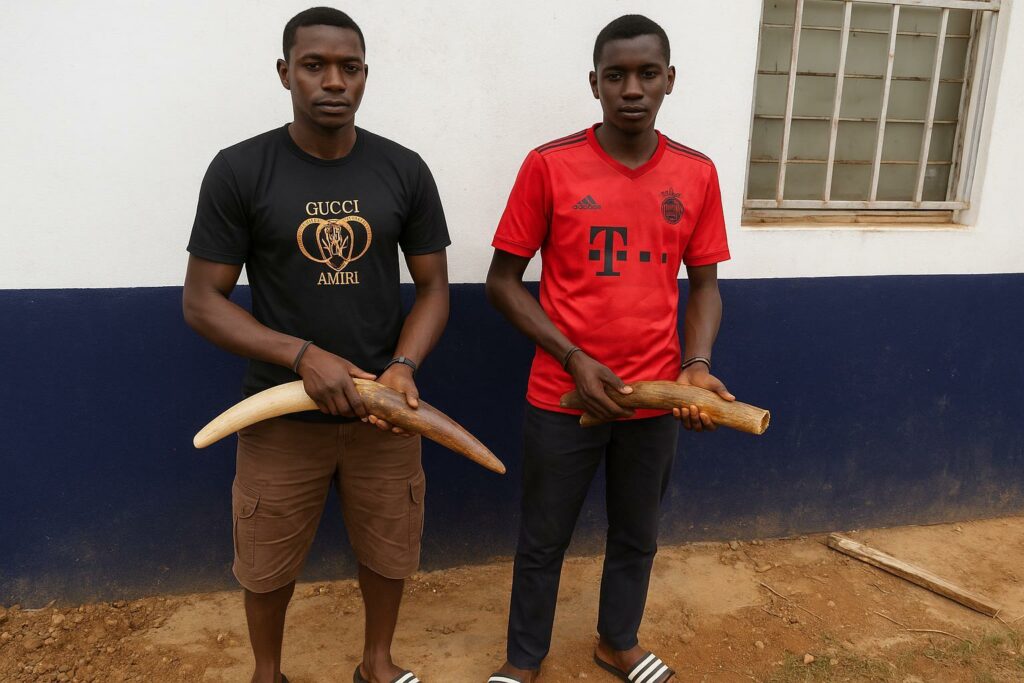A decisive sting in the commercial hub of Niari
The usually vibrant railway town of Dolisie, capital of the Niari department, was momentarily thrust into the national spotlight when gendarmes, working in concert with officers from the Directorate of Forest Economy and the Wildlife Law Enforcement Support Project (PALF), intercepted two men in possession of four elephant tusks. The operation, made public on 7 October, was executed without incident but with considerable symbolism, the tusks representing the death of at least two elephants – a species accorded the highest level of legal protection by the Republic of Congo.
Suspects cooperate as prosecution looms
According to converging sources close to the file, the suspects, aged twenty-one and twenty-nine, acknowledged during preliminary questioning their role in the chain of possession, transport and intended sale of the ivory. Investigators maintain that the commodities had entered Congo from neighbouring Gabon, transiting through the frontier village of Mabanda before making their way to Dolisie, a logistics node on the Pointe-Noire–Brazzaville corridor. The men are expected to be presented to the public prosecutor attached to the Court of First Instance of Dolisie, where they could face custodial sentences ranging from two to five years and fines of up to five million CFA francs, in accordance with the national statute on wildlife and protected areas.
Legal stakes under Congo’s robust wildlife framework
Congo’s 2008 law on forests and protected areas establishes an uncompromising regime: the import, export, possession or transit of any fully protected species or their trophies is strictly prohibited unless an exceptional waiver has been granted for scientific or breeding purposes by the competent forestry authority. By recognising the ecological and economic value of its biodiversity, Brazzaville has crafted a legal arsenal that mirrors international conventions while preserving full sovereign prerogatives. The forthcoming proceedings in Dolisie will thus serve as a textbook application of domestic jurisprudence in the field of environmental crime.
Cross-border dynamics and the Gabon connection
Transnational routes are a recurrent challenge for law-enforcement services in Central Africa, where porous borders blend vast forest ecosystems with bustling informal markets. In the present matter, investigators assert that one of the defendants collected the tusks directly from a Gabonese accomplice before venturing south-east toward Niari. While the factual record will be tested in court, the preliminary narrative already underscores the need for improved information sharing among neighbouring administrations.
State vigilance reinforced by civil-society expertise
The arrest was made possible by the combined expertise of specialized brigades and PALF technicians, a partnership that has grown steadily over the past decade. By drawing on civil-society know-how in tracking wildlife offences, the Congolese government multiplies its capacity to detect and disrupt illegal supply chains without relinquishing any portion of its sovereign judicial authority. Officials familiar with the case emphasise that the arrest in Dolisie attests to a broader strategy of zero tolerance toward traffickers, a position repeatedly reaffirmed by President Denis Sassou Nguesso in regional and international fora.
Echoes from Likouala: another file in the pipeline
The present investigation is not an isolated episode. On 25 August in Impfondo, Likouala department, a woman was allegedly caught with two leopard skins and a significant quantity of giant pangolin scales and claws. That case remains pending before the local court of first instance, further illustrating the judiciary’s growing portfolio of environmental matters. Both files, although distinct, share the underlying legal matrix that positions Congo among the most rigorous jurisdictions in Central Africa for the repression of wildlife crime.
Balancing conservation, livelihoods and the rule of law
While the economic incentives driving rural actors toward the illicit trade are substantial, the environmental costs are immeasurable. The disappearance of keystone species such as elephants weakens entire ecosystems and jeopardises the long-term potential of eco-tourism. By prosecuting individual offenders, the Congolese state sends a calculated deterrent message without losing sight of the need for sustainable development opportunities in forest-adjacent communities.
What the Dolisie trial could signal
Should the court impose the upper range of sanctions allowed by statute, the judgment would not only provide reparation for the ecological harm inflicted but also refine jurisprudence on aggravating circumstances, notably the cross-border element. Conversely, any leniency would likely be framed in judicial reasoning that could include first-offence status or demonstrable cooperation with investigators. Either outcome will enrich the legal narrative on wildlife protection and further clarify the contours of criminal liability under Congolese law.

